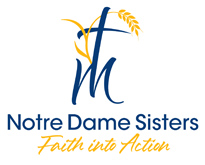REFLECTION FOR THE FOURTH SUNDAY OF ADVENT…DECEMBER 24, 2023
by Sr. Mary Ann Zimmer, ND
First Reading: Second Book of Samuel 7:1-5, 8b-12, 14a, 16
Responsorial Psalm: Psalm 89: 2-3, 4-5, 27, 29
Second Reading: Romans 16;25-27
Gospel: Luke 1:26-38
This year the fourth week of Advent is barely a breath long! Christmas Eve is already upon us. Mary gets pregnant in this morning’s gospel and gives birth tonight.
Still, this week’s readings have something important to tell us about the child to be born. He will be the fulfillment of the promises made to the line of David. (2nd Samuel 7). St. Paul proclaims praise for the “wise God” who has finally revealed salvation through Jesus Christ.
Finally, in the Gospel of Luke we hear the familiar Annunciation account that tells us that this child to be born of the line of David is given to the world through the direct will of God with the consent of Mary. The annunciation is a story-type that would have been familiar to the early Christians who were steeped in the stories of Hebrew scriptures. The Hebrew scriptures give at least three of these types of accounts that all include a barren woman, an announcement by a divine messenger, an expression of doubt and fear, reassurance, and a sign. Abraham’s wife Sarah (Genesis 18:11), Samson’s mother (Judges 13:2), and Hannah, the mother of the prophet Samuel (1 Samuel 1:19), all shared in this experience. The common thread among these exceptional pregnancies is the clear claim that they came about through divine intervention in situations where a child was considered humanly impossible. These pregnancies all resulted in the birth of an exceptional leader.
In the Gospel of Luke this format for describing God’s power is used twice. Both the birth of John the Baptist and the birth of Jesus are announced in this way. The account of Jesus’ conception ups the stakes of this kind of divine intervention because Mary is not just barren or elderly, she is to be pregnant without the participation of a man. This announcement shifts the pattern from God intervening in the improbable to bringing about the impossible. In this way the Annunciation points to a radically different kind of significant child—a radically intensified promise of salvation.
In Jesus, God’s promise of salvation is embedded in human life. We are both its beneficiaries and its agents. It is available to us in every glimmer of faith, hope, or love that we find in our divinely rooted human living. It is also available whenever we grieve for the times and places that cry out for salvation.
This Advent all the readings about the beauty of God’s coming salvation and the promises of David’s reign of peace break my heart. The reality of the suffering of today’s Israelis and Palestinians is simply too present. Please join me in praying and working for peace with justice and for the alleviation of all the human devastation of war. May all that we do give our consent to God’s daily offer of salvation that awaits our assent.
